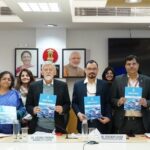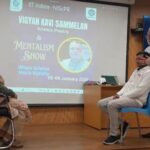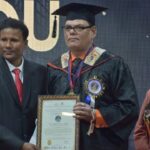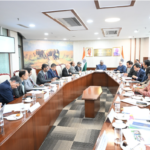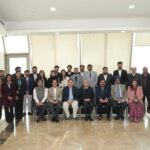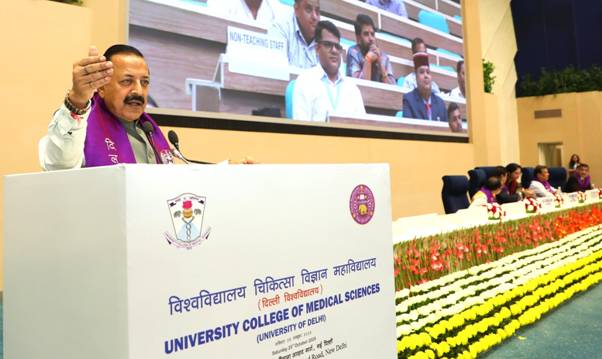
Delhi, October 25, 2025: Union Minister Dr. Jitendra Singh today underscored the rapidly evolving landscape of medical education and healthcare in India, emphasizing a transformative decade that has made healthcare more accessible, affordable, and inclusive.
Addressing the 54th Foundation Day and College Convocation of the University College of Medical Sciences (UCMS), University of Delhi, Dr. Singh conferred degrees upon undergraduate and postgraduate students and encouraged the new generation of doctors to embrace innovation while remaining rooted in compassion.
Dr. Singh highlighted the significant expansion of medical education in India, noting that undergraduate medical seats have grown from 45,000 a decade ago to nearly 1.5 lakh today. He emphasized the role of institutions like AIIMS in democratizing medical education and enabling greater participation of women in the field.
The Minister described the transformation of healthcare delivery as three-fold — accessible, affordable, and available — crediting initiatives such as Ayushman Bharat and Jan Aushadhi Kendras for strengthening the state-citizen relationship in health. He also highlighted India’s growing global credibility in life sciences, citing breakthroughs such as the world’s first DNA COVID-19 vaccine, the HPV vaccine for cervical cancer prevention, the indigenous antibiotic Nafithromycin, and successful gene therapy trials for haemophilia.
Dr. Singh encouraged UCMS and similar institutions to collaborate with the private sector and government laboratories for advanced clinical trials and research, emphasizing the need for integration rather than working in silos.
A Souvenir marking UCMS’s 54-year journey was released, celebrating the college’s milestones in medical education, research, and community healthcare. Dr. Singh also presented awards and medals to meritorious students and faculty in recognition of their academic excellence and contributions to medical research and teaching.
Highlighting emerging healthcare challenges, he noted the coexistence of communicable and non-communicable diseases, an ageing population, and the increasing role of artificial intelligence in medicine, including tele-mobile clinics that combine empathy with technological innovation.
Concluding his address, Dr. Singh inspired graduates by stating, “Those receiving their degrees today will be at the prime of their careers when India celebrates 100 years of independence in 2047. Destiny has given you the opportunity to be the architects of a healthier, more self-reliant India.”
The event was attended by faculty members, students, and senior officials of UCMS and reflected the government’s vision of aligning medical education with national priorities in science, technology, and innovation.

